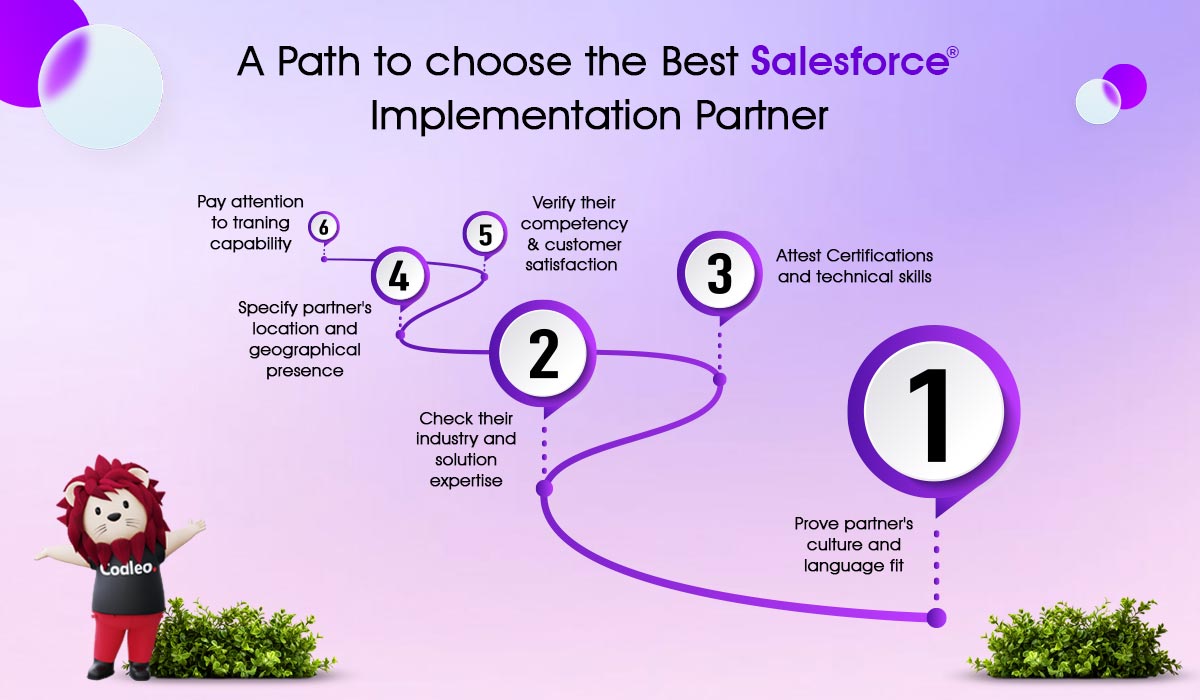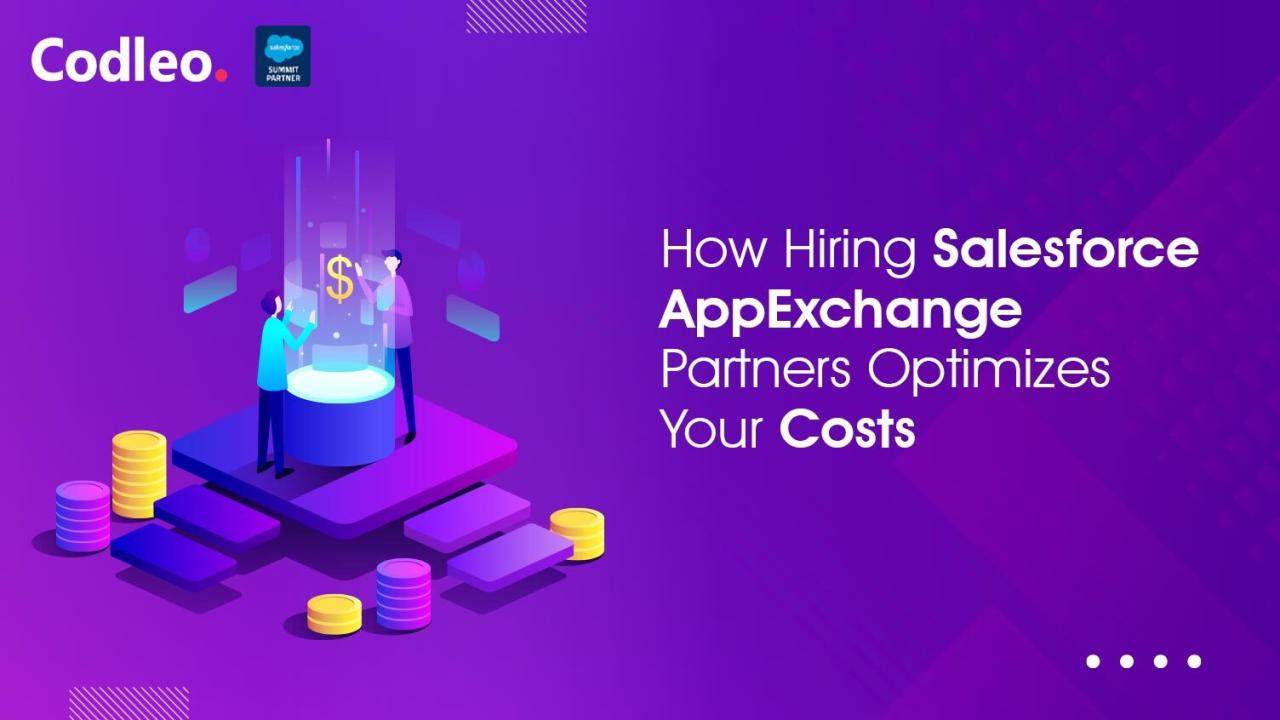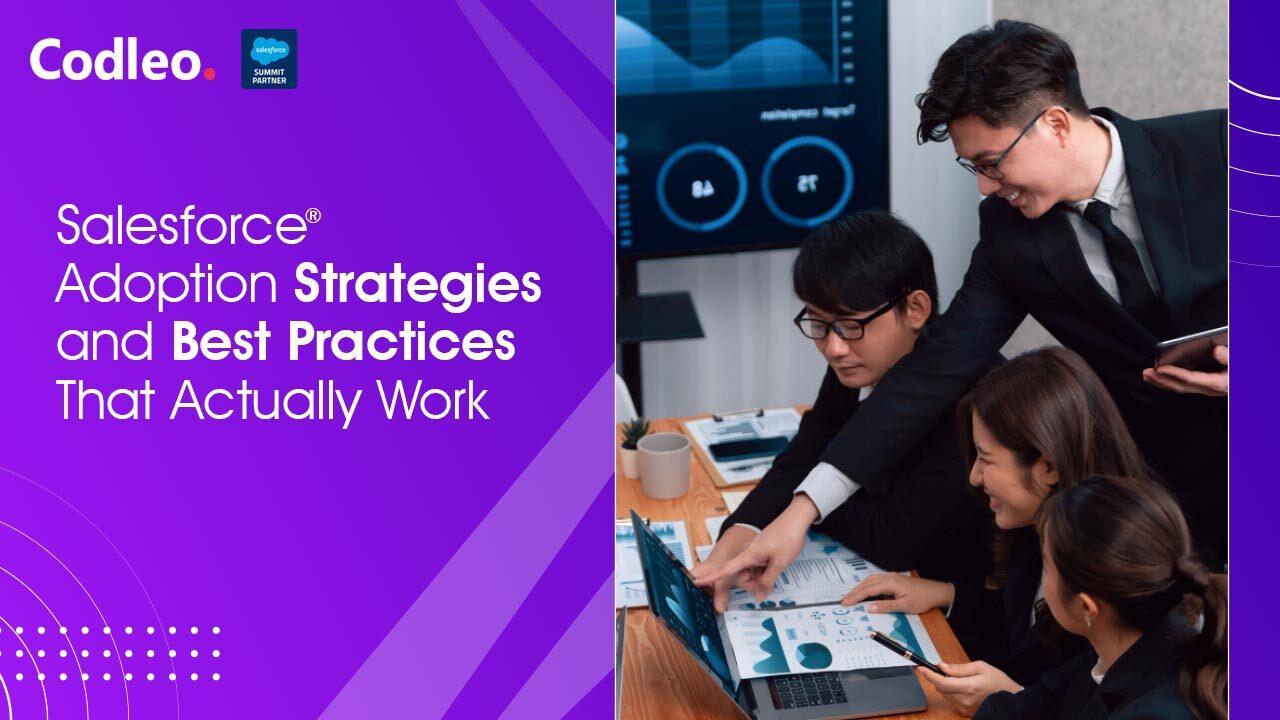Publish date:
This guide will be beneficial if you and your team aren’t Salesforce experts and lack the time or resources to become proficient, but still want to take advantage of the Salesforce platform.
It will explain the benefits of collaborating with Salesforce partners for any implementation project compared to self-implementation while shedding light on the concept of partnership. Furthermore, we will discuss tips on selecting the best Salesforce implementation partner. Just keep reading for more information.
Salesforce Implementation Partner – Who Are You?
Before discussing the role of a Salesforce implementation partner, it’s essential to define what Salesforce implementation entails.
Salesforce implementation is a step-by-step process of setting up and utilizing the Salesforce platform within an organization.
However, it's essential to understand that it encompasses much more than just the technical aspects.
The implementation process also includes tasks such as data cleaning, integrating apps, training employees, and other crucial steps to ensure that your team fully utilizes your Salesforce software and delivers real value to your business.
For more information on how to make the Salesforce implementation process seamless, refer to our latest guide.
An implementation partner can provide you with:
-
Guidance on implementing a Salesforce solution tailored to your company’s specific requirements.
-
Advice on finding the best Salesforce pricing options, as there are many details to consider and ways to significantly reduce costs if you don’t require the full range of functionalities.
-
A selection of AppExchange applications to use instead of opting for custom development.
-
Ensuring that your software solution is technically robust to prevent future issues related to updates, data architecture, security, and excessive customization.
-
Managing the risks associated with the project's scope, timeline, and budget.
-
Promoting and addressing change management if necessary for user adoption.
Depending on the intricacy of your project, the team from the Salesforce partner may include Salesforce administrators, Salesforce consultants, developers, architects, AppExchange consulting partners, or a combination of these roles. Now, let's discuss the functions these specialists fulfill and what the various Salesforce certifications might signify.
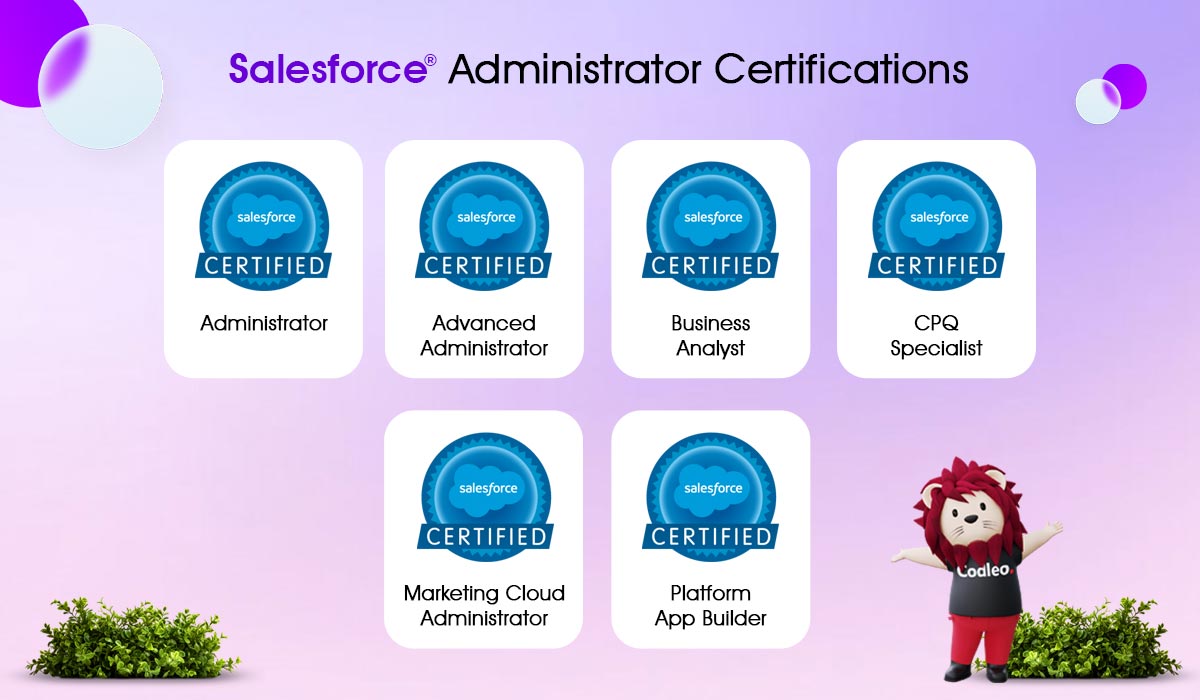
Salesforce administrators assist their clients in managing the platform. They solve problems, answer user questions about using Salesforce, and improve the platform with new tools and features.
There are three categories of Salesforce-certified administrators: Salesforce Certified Administrator, Salesforce Certified Advanced Administrator, and Platform App Builder. These foundational Salesforce certifications are essential for establishing a Salesforce consulting partnership.
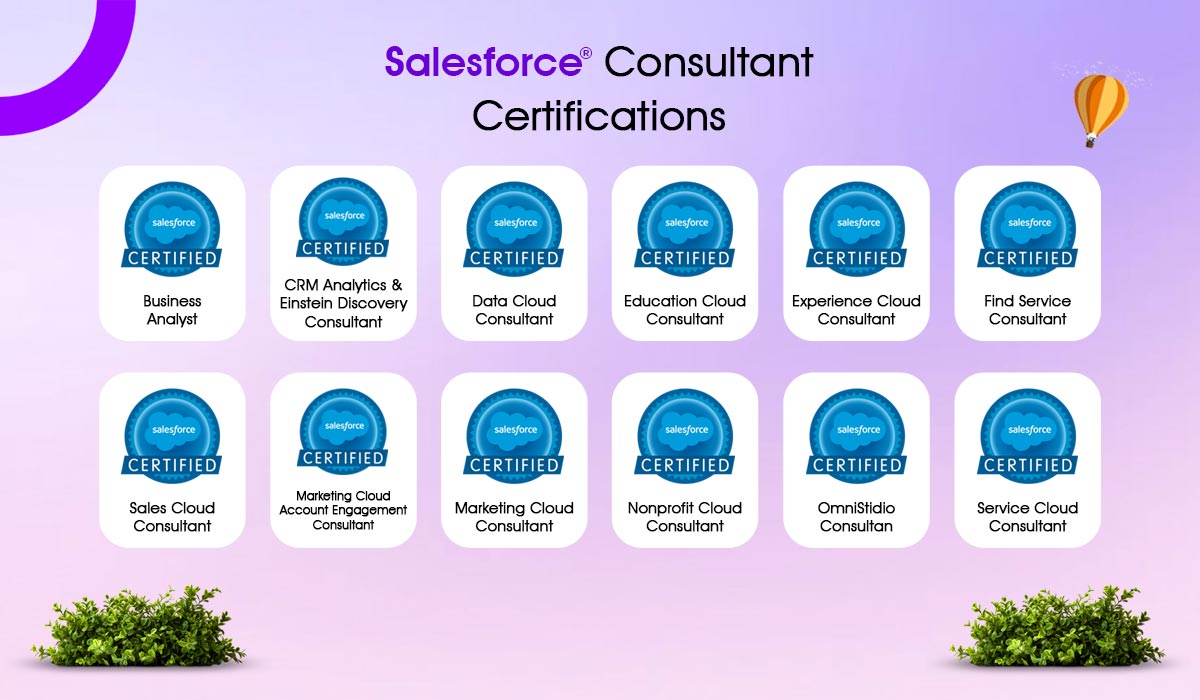
Salesforce consultants assist clients with tasks such as software migration, system customization, integration, and custom application development. They show their skills through Salesforce certifications and successful project work. There are many different consulting credentials available, which is impressive.
-
CPQ (Configure, Price, Quote) Specialist
-
Service Cloud Consultant
-
Field Service Lightning Consultant
-
Community Cloud Consultant
-
Einstein Analytics and Discovery Consultant
-
Education Cloud Consultant
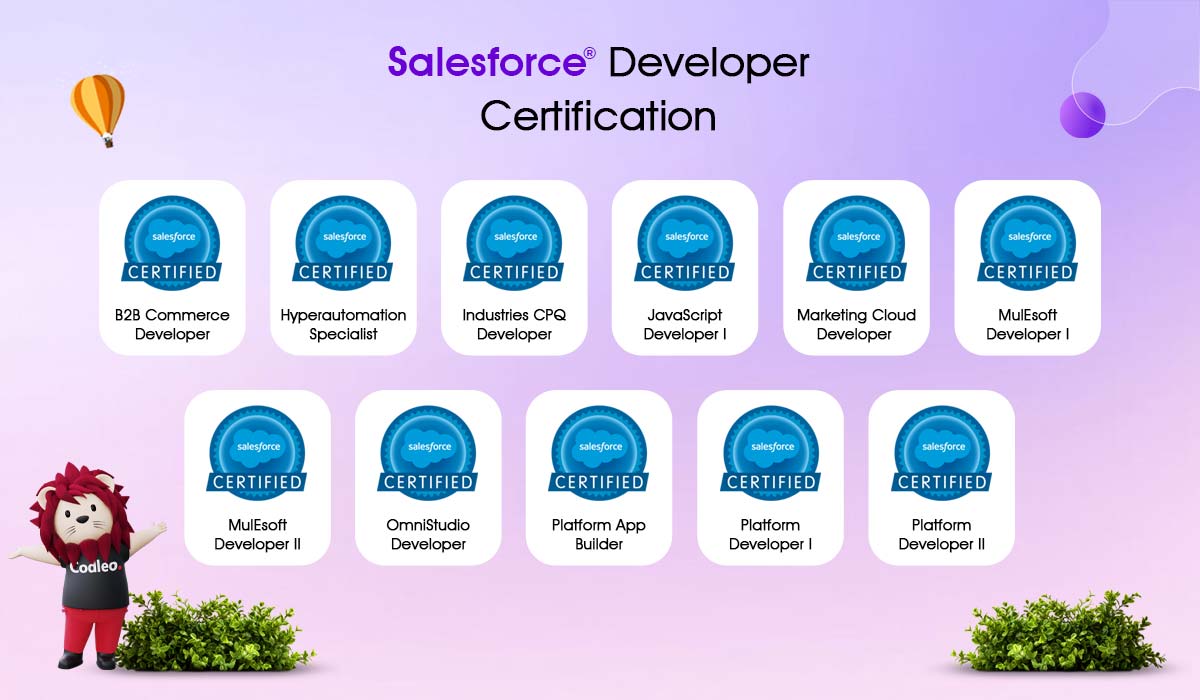
Salesforce developers create tailored applications and analytics utilizing the platform's declarative tools.
These experts are essential when your Salesforce deployment requires database design and platform customization.
There are three categories of Salesforce-certified developers: Platform Developer I, Platform Developer II, and JavaScript Developer I.
Salesforce architects help design and develop high-performance functionalities across various platforms.
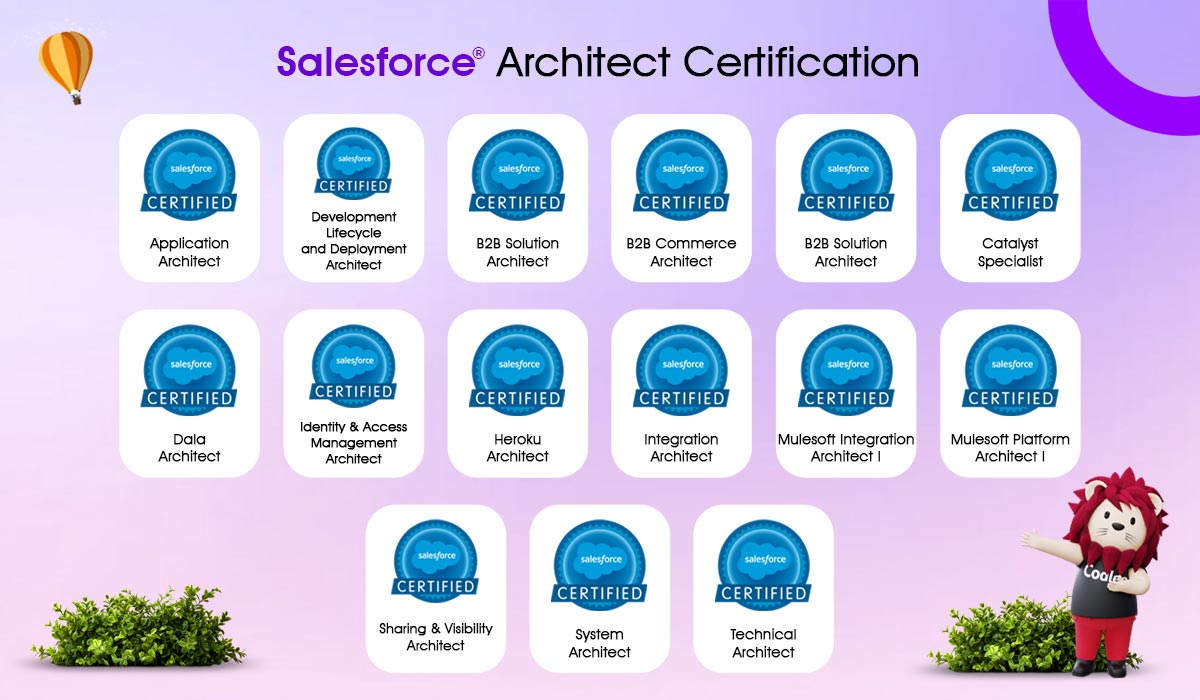
However, if your project needs a more narrowly focused specialist, the list of certificates can go way further:
-
Data Architecture and Management Designer
-
Sharing and Visibility Designer
-
Identity and Access Management Designer
-
Integration Architecture Designer
-
Development Lifecycle and Deployment Designer
-
Mobile Solutions Architecture Designer
-
Heroku Architecture Designer
-
Application Architect
-
System Architect
-
Technical Architect
AppExchange partners create and offer commercial solutions on AppExchange, the Salesforce marketplace. These solutions range from foundational software development components, such as Lightning or Bolt solutions (templates for community solutions), to fully developed apps operating on the Salesforce platform and utilizing external services.
If your project uses Marketing or Commerce Clouds, it is best to choose Salesforce implementation partners with experience and the proper certifications in these areas. Look for partners with certifications like Pardot Specialist, B2C Commerce Architect, or Salesforce Accredited B2B Commerce Administrator.
Salesforce Implementation Partnership —Mutual Benefits
This collaboration may seem unusual, but it helps clients, associates, and Salesforce.
How a customer can benefit:
-
Get a faster return on your investment.
-
Access expertise and resources you don’t have in-house.
-
Meet all your business goals.
-
Learn best practices from your partner’s experience.
How a partner can benefit:
-
Build better relationships with customers and Salesforce.
-
Keep customers happy and interested in more products and solutions.
-
Receive good ratings on the Salesforce Consulting Partner tab in AppExchange.
-
Gain experience with projects of various complexities.
How Salesforce can benefit:
-
Improve their solution based on customer feedback.
-
Build strong, trusted relationships.
-
Grow their happy customer base.
-
Increase revenue without spending on sales and marketing.
Working with a CRM implementation partner is never too early or too late.
If you are considering or have already implemented Salesforce, you can always seek help from partners.
Bringing them in early can reduce the chances of problems arising.
So, how can Salesforce implementation partners like Codleo assist you?
First, our experts will create a customized plan for implementing Salesforce that meets your company’s specific needs. We will estimate your project's best, worst, and most likely timeframes and budgets.
Next, we will identify potential risks and suggest ways to address them. Based on your company’s strengths and weaknesses, we’ll also provide tips for data migration, systems integration, customization, and app development.
This will help you determine which internal team members can handle specific tasks and which external Salesforce specialists you may need to hire.
Finally, if you already have a Salesforce implementation plan, we can provide a second opinion to confirm its accuracy and validity. If you are facing challenges or have new ideas, our consultants will recommend the best cost-effective solutions and suggest Salesforce experts to assist with deploying and maintaining functionality.
How to Choose the Best Salesforce Implementation Partner – Essential Hints
What makes a Salesforce specialist the right technology partner for you?
While technical skills are essential, they are not the only factor to consider.
To find the right partner, focus on more than just their technical skills. They should feel like collaborators, not just those who follow orders.
So, what should you focus on for a successful Salesforce implementation partnership, and how can you find your ideal partner?
This section offers valuable insights into key factors to consider when selecting an implementation partner.
#1 Culture and Language Fit
It might sound unusual, but having a shared company culture, vision, and means of communication is far more crucial than possessing specific technology skills.
To truly transform your project into a success, you must be united in purpose, share the same interests, be passionate about your work, and be dedicated to achieving the project's success.
In this scenario, such partners will not only handle the tasks you hired them for but also provide guidance and contribute to what is best for your project in all aspects, supporting you throughout the implementation process.
What can Codleo Consulting provide you regarding culture and language alignment?
We are in complete harmony with your business values, enthusiasm, and commitment to projects of any complexity. Due to the innovation and dedication embedded in our DNA, we are prepared to tackle any challenge.
Our onshore, offshore, and blended engagement models ensure a cultural and linguistic connection for companies worldwide. Discover what one of our European-based clients has to say about our work processes and company values.
#2 Industry and Solution Expertise
A Salesforce partner may have strong technical skills and many certifications. However, if they don't understand the needs and issues specific to your industry, you may not achieve satisfactory results from working with them.
This is especially true for specialized fields, such as commercial real estate and capital markets.
To effectively address the problem, it is essential to adopt a problem-solving mindset, which is why seeking out Salesforce implementation specialists with industry-specific experience is advisable for achieving better results.
Regarding Codleo, we have been active in the commercial and real estate sectors for over five years.
This experience has enabled us to gain insights into the entire Salesforce ecosystem from the perspective of the real estate industry.
While our primary focus is real estate, we have also effectively implemented CRM optimization and custom development across various sectors, including Finance, Insurance, and Real Estate Investment. Discover more about our industry expertise here.
#3 Certifications and Technical Skills
When selecting a Salesforce implementation partner, certifications are crucial for establishing a company's trust.
But do all Salesforce certifications matter equally to you?
If you run a small or mid-sized business and don't plan to customize your software, consider whether you need to pay more for a company with many certifications and solution architects.
While it indicates their versatility, it’s essential to recognize that these certifications come at a cost and require regular verification. So, why should you invest in unnecessary expertise in such a scenario?
Similarly, the breadth of their technical abilities and experience in implementation can be validated through various project case studies, as well as the presence of custom-developed applications for both their clients and themselves, along with client feedback and recommendations. Such practical experience reflects a deep understanding of the various tech stacks utilized in software development.
At Codleo, we continually enhance our existing applications and create new software solutions to keep pace with market demands and the needs of our clients' businesses. This commitment positions us as technology experts, grounded in practical experience rather than just theoretical knowledge.
#4 Location and Geographical Presence
The location of your Salesforce implementation partner affects how you engage with them. You can work with a local partner, hire an expert from another country, or choose a company with a global presence that operates in your time zone at a lower cost.
Our global resources, located in Dallas, Texas, and Europe, enable us to offer a range of options. You can select any combination of Salesforce teams that fits your budget and needs without sacrificing quality.
#5 Competency and Customer Satisfaction
One helpful tip for selecting the right Salesforce implementation partner is to review the company's rating and the total number of projects it has successfully completed.
Additionally, it’s beneficial to request customer references or case studies related to similar projects to assess the partner’s track record and the extent of their experience with different clients.
Review platforms such as themanifest.com, Clutch.co, and AppExchange can provide valuable and objective customer feedback.
What sets these reviews apart is that these platforms verify the identity of reviewers before publishing their feedback, thereby minimizing the likelihood of receiving biased or unconstructive comments.
Our core principle is to maintain transparency and fairness with our clients, as reflected in the reviews from our customers on our website and independent sites such as Clutch.co and AppExchange. Furthermore, our website features case studies and interviews with our clients, providing more information about their business challenges and how we assisted them in overcoming these challenges.
#6 Training Capability
The deployment of your Salesforce solution is just the beginning. To ensure user adoption, provide ongoing training and support throughout the process.
It might necessitate assistance from your partner in developing educational videos, sandbox environments, and post-training support to ensure that all concerns are addressed and resolved.
Our team is as committed to achieving successful Salesforce adoption in your organization as you are, so Codleo must ensure that every team member can effectively utilize Salesforce. Our Salesforce consultants not only produce educational videos for our clients but also craft expert articles on specific topics of interest to our customers. All of these Salesforce-related educational materials can be accessed on our blog.
Free Add-On: A Ready-to-Use Set of Questions for Choosing Your Salesforce Partner
To help you assess your potential partner, use this list of interview questions:
-
Can you describe a similar project and the results you achieved?
-
Can you provide case studies?
-
Can you share customer references?
-
Can you discuss a project that didn’t go as planned and how you addressed the issues?
-
What technical skills and certifications does your team offer for my project?
-
What experience do you have in the "X" industry?
-
How many similar projects have you completed?
-
Have you worked with my company before?
-
Will your team work on-site, remotely, or both?
-
How would you describe your company culture?
-
How have you helped other customers with similar goals?
-
What challenges do people face with this type of business change?
-
How did you help your customer overcome those challenges?
-
Can you train our admins?
-
Can you train our users?
-
What method do you use for delivery?
-
How much lead time do you need to staff the project?
-
Will certified resources be assigned to my project?
-
How confident are you that the same team members will complete the project?
-
How many similar projects have these team members completed?
-
What support do you need from us?
-
What time commitment do you need from our team?
-
How much access do you need from our subject matter experts (SMEs)?
Identify Salesforce Implementation Roles
What are the standard responsibilities of Salesforce implementation partners in projects? Which roles can your team undertake, and which should your implementation partner handle?
These and other inquiries are addressed in the following sections.
Your primary objective, as well as that of your Salesforce implementation partner, is cultivating a collaborative relationship. You must identify which tasks in software implementation you will carry out and which your partner will manage.
Let’s categorize typical project roles into three ownership groups: those that the customer can carry out (you), those that your partner can handle, and roles that both can fulfill.
Implementation Roles Performed by a Customer
The Business Executive Sponsor leads communication and implementation efforts.
The IT Executive Sponsor sets priorities for IT tasks, outlines the deployment budget, and removes technology barriers.
The Client Subject Matter Expert (SME) primarily describes a typical day for various roles, aids in process flows, supports user experience and user acceptance testing (UAT), and collaborates with the implementation team to ensure a viable solution is being developed.
Implementation Roles Performed by a Partner
The Engagement Manager's role involves sharing knowledge of the proposed solution, communicating client requirements to the implementation team, and managing critical escalations for both clients and the team.
The Solution Consultant's responsibilities encompass leading solution workshops, facilitating discussions on business processes and their automation, offering advice on optimal practices for security models, demonstrating mobile deployment strategies, addressing business processes, workflows, data validations, and analytics, and designing and configuring solution specification deliverables.
Joint Implementation Roles
The Project Manager communicates with the project team, creates and manages the project plan, and monitors milestones, budget, and schedule. They also identify potential risks.
After the launch, the Salesforce Admin will handle system maintenance, user support, and manage any necessary post-implementation activities.
A Change Management Expert is required to develop and execute the adoption strategy.
Remember that in smaller projects, the team may consist of only one or two individuals taking on multiple roles. The project's scope and complexity will determine which roles are filled by the partner and which are assumed by you.
Choose a Salesforce Implementation Partnership Model
It’s now time to select the partnership model that suits you best by examining the advantages and disadvantages of three primary Salesforce implementation scenarios:
-
When the partner handles the entire implementation
-
When both the Salesforce implementation partner and you collaborate on the implementation
-
When you take on the whole implementation with the support of a partner
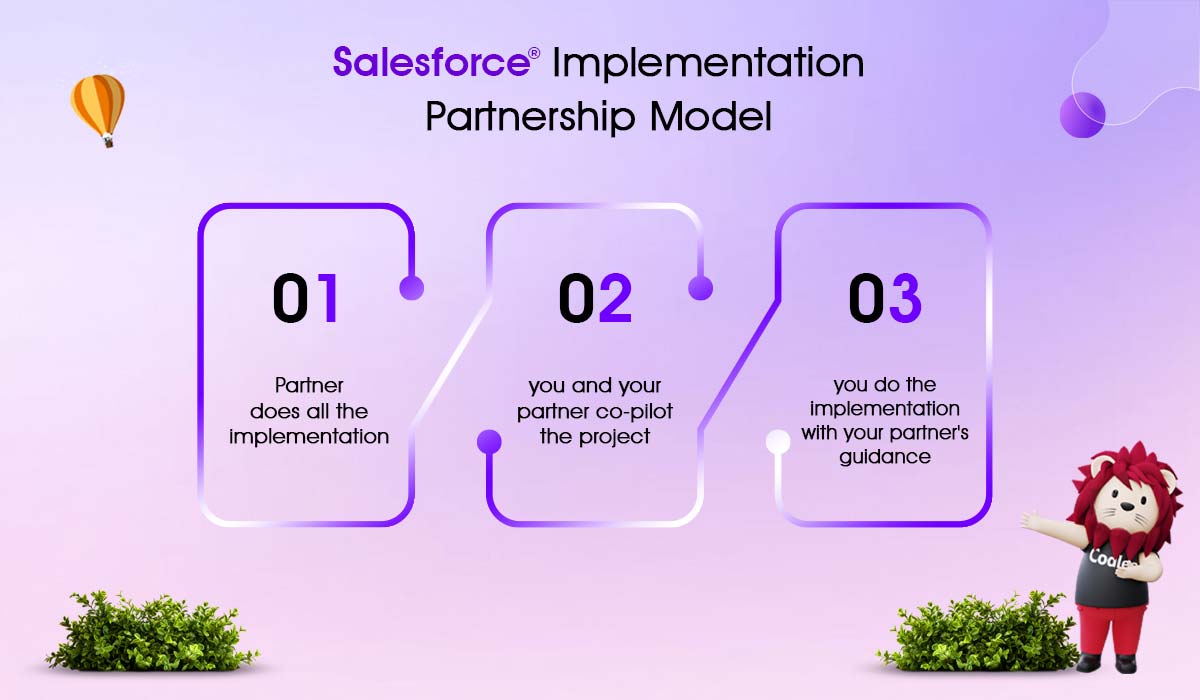
The Partner Performs All of the Implementation
In this type of partnership, the partner handles most of the project work for implementation.
Advantages of this approach
-
Salesforce experts use their product and industry knowledge to handle technical tasks.
-
They have experience with implementation processes.
-
Their main goal is to connect business processes with the desired outcomes.
Disadvantages of this approach
-
Higher implementation cost.
The Partner and You Perform the Implementation
In this partnership model, you and your partner share the responsibilities of working together on development.
Advantages of this approach
-
Lower costs for implementation
-
Salesforce experts create the system design.
-
Your staff will get hands-on experience customizing the solution.
-
We provide additional training for your team to support the solution after it has been set up.
Disadvantages of this approach
-
Managing complex projects involves coordinating both outside and inside resources.
-
Implementation will take longer than usual.
You Perform All of the Implementation with a Partner’s Guidance
In this model, you will own all the deliverables while your partner acts as an advisor.
Advantages of this approach
-
You become self-sufficient.
-
Your team learns how to use the platform efficiently and effectively supports your business processes.
Disadvantages of this approach
-
More time is needed to complete the project.
It doesn't matter which model you choose. The key is to work with the right partner at the right time.
Wrapping Up
Choosing a Salesforce implementation partner can be both complex and straightforward, particularly if you are seeking a technology partner for the first time.
To simplify this process, start with Salesforce specialists who can clearly explain complex ideas while taking your needs into consideration. This is where Codleo's Salesforce consultants can help. They have strong technical skills, practical experience, and a genuine enthusiasm for Salesforce.
Contact our Salesforce support team to learn how we can assist you.




